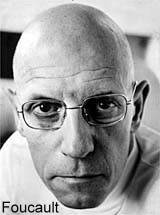 |
傅柯專題
Seminar on Foucault
授課教師 何春蕤
(九十學年度第一學期課程)
|
|
|
|
第一週:Course introduction
 Why is it hard to grasp Foucault? Because his writing: Why is it hard to grasp Foucault? Because his writing:
- resists being treated as a comprehensive and integrated package: new ideas surface and change; no general theoretical perspective, instead, he could be read thru multiple perspectives
- resists being situated in relation to established intellectual traditions: he does not engage in direct debates with them
- avoids using established concepts: e.g. class, gender, etc.
- rejects conventional wisdom: he revamps old topics in new ways, e.g. prison
- breaks with the natural or common-sense reality of many topics: he challenges the self-evidence of madness, sexuality, etc.
- maintains ambiguous relation with existing disciplines: such as philosophy, history, sociology
本課程:This is my second course on the problem of modernity, following a previous course on Modernity and Modern Romantic Love. So in this course, we will be reading Foucault』s work as an effort to express a disenchantment with the modern condition. His work hovers between enthusiasm and fatalism; it demonstrates a suspicion of polarities of power. 本學期選讀的特別是Foucault所寫的和body及sexuality相關的篇章。因為在這兩個領域中,polarized analysis在社運上已經證實有問題,而Foucault 的權力的微觀物理學(Micro Physics of Power)在對抗左翼或女性主義的簡化主義(reductionism)上都很有用,正如Giddens討論現代性如何產生主體性,也一樣很有用。
Possible approaches and Foucault』s major themes:
- 我們可以學習像他一樣關注conditions of possibility of the forms of social knowledge and practices which form the immediate subject matter of his inquiries: 但是不可假設有causal inquiry (因為這就是假設有linear and evolutionary change in social life, teleological thinking, human intentions and desires and conspiracies)。事實上,看來不相連的社會活動領域有可能匯集而成新的結果
- 傅柯企圖解釋discursive formation, episteme: how a particular way of organizing thinking, talking and doing took the form and content that it did; 特別是論述的形成。language constitutes social subjects, identities, and the field in which they exist; they structure inclusionary and exclusionary practices
- knowledge/power: his work criticizes sites of specific knowledge production that subordinate other knowledges; discourse joins power and knowledge
- power: non-repression oriented; no simple polarities of power; micro-physics of power
- discipline: 當我們注意small power時自然會注意everyday life; technologies of power; surveillance; discipline makes individuals
- governmentality: bio-political power is established to control populations in order to extort greater efficiency, productivity, economy; range of infinitesimal power relations that permeate the body, sexuality, family, kinship, discourse, etc.; 政府政策可能造成人口的有效率經管,但是這些策略不一定和中央集權式的政府有直接關連。
下週閱讀Foucault有關文學和論述的部份,以ease our way in to Foucault.
|
|